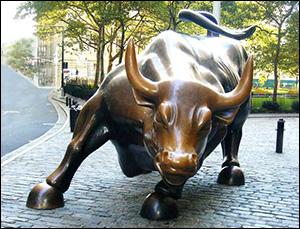By Pam Martens and Russ Martens: August 15, 2016
At the end of the first quarter of this year, Switzerland’s central bank held $119.7 billion in publicly traded stocks. The Swiss National Bank’s (SNB) web site indicates that it is now allocating 20 percent of its foreign currency reserves to stock investing. Twelve days ago, SNB made its quarterly filing with the U.S. Securities and Exchange Commission showing large positions in individual U.S. stocks.
In just five tech names, SNB held over $5.3 billion with $1.489 billion invested in Apple; $1.2 billion invested in Alphabet, parent of Google; $1 billion in Microsoft; $803 million in Amazon and $741.5 million in Facebook.
Both Apple and Microsoft are among the 30 stocks that make up the Dow Jones Industrial Average (DJIA), a heavily watched gauge of the U.S. economy’s health. The Swiss National Bank owns over $1 billion in two other names in the DJIA: $1.17 billion in Exxon Mobil and $1.032 billion in Johnson & Johnson.
Swiss National Bank positions of $500 million or more that are components of the DJIA include: AT&T ($862 million); General Electric ($823 million); Verizon ($739.6 million); Procter & Gamble ($718 million); Pfizer ($644 million); Coca Cola ($582 million); and Chevron ($557 million).
Switzerland’s central bank has invested zero dollars in two DJIA components — the two big Wall Street banks, Goldman Sachs and JPMorgan Chase.
The Swiss National Bank is just one of more than a dozen central banks that are now investing in publicly traded stocks – a policy that looks like a train wreck in motion to quite a number of Wall Street veterans.
We checked SEC filings for other central banks that are known to be buying stocks but could find only one other listing: the Bank of Israel. Instead of breaking down the names of the stocks, number of shares, and dollar value of the individual position held as done by the Swiss National Bank, the only public filing from the Bank of Israel tells us simply that it is using three money managers to make its U.S. stock investments. Those money managers are: UBS Asset Management Americas Inc.; BlackRock Investment Management (UK) Ltd.; and State Street Global Advisors Ltd.
We could find no total dollar amount indicated for the Bank of Israel’s investments in U.S. stocks in its SEC filings but in 2013 Bloomberg News reported that the Israeli central bank had spent “about 3 percent of its $77 billion reserves on U.S. stocks,” or approximately $2.3 billion. On June 27 of this year, Reuters reported that Israel’s Monetary Policy Committee had approved investing as much as 10 percent of Israel’s foreign currency reserves in stocks.
Another major central bank plowing into stocks is the Bank of Japan. On April 24 of this year, Bloomberg News reported that the Bank of Japan “ranks as a top 10 holder in more than 200 of the Nikkei gauge’s 225 companies…”
If one adds the stock holdings of massive sovereign wealth funds, which are also deploying government money, to the growing stock market participation of central banks, alarm bells start to go off. Forbes contributor Adam Sarhan wrote the following earlier this year:
“Over the past 7 years, we have seen unprecedented action from global central banks all aimed at keeping stock prices up. It’s normal to see global central banks adjust monetary policy, up or down, based on economic conditions. But it is not normal to see global central banks print gobs of money every day to stimulate markets and it is definitely not normal to see them buy stocks outright. I’m not a lawyer but it raises the question: Is it even legal? I’m sure the BOJ is not alone in this questionable activity. The U.S. Fed refuses to be audited. One is compelled to ask: Why?”
Economist Ed Yardeni also voiced concerns on his web site in April, writing:
“In the long run, it’s hard to imagine that having the central monetary planners buy corporate bonds and stocks with the money they print can end well. In effect, the central banks are turning into the world’s biggest hedge funds, financed by their own internal primary (money-printing) dealers and backstopped by the government — which can always borrow more from the central bank or force taxpayers to make good on this Ponzi scheme…”
Wall Street On Parade has written a great deal about “dark pools,” those regulator-lite trading venues that are operated by the big Wall Street banks and function as in-house stock exchanges. Until we start to see more granular data at the SEC on exactly what central banks are buying and selling on U.S. stock exchanges, consider it just more “dark pool” activity and one more reason for the public to view these markets with a cynical eye.


